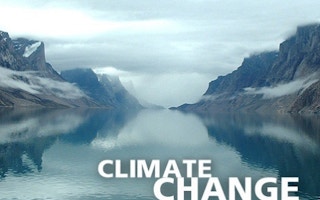When President Obama gave his State of the Union address in January, there seemed to be more commentary among environmentalists about what wasn’t said than what was: specifically, his failure to even mention the words “climate change” or “global warming” or “carbon” despite speaking effusively about the need for clean energy development.
There has already been plenty of reflection on this rhetorical retreat, with good summaries and analysis coming from Andy Revkin of The New York Times and Bryan Walsh of Time magazine. The reason for Obama’s sudden climate shyness is well known. Even Republican pollster Frank Luntz has advised those fighting climate change not to mention “climate change,” but to focus instead on alternative energy and more popular reasons to support it, particularly those related to security and the economy. Hendrik Hertzberg, noting what a change this marked from Obama’s previous speeches, in which he spoke forcefully on climate, called it a “masterly exercise in rear-guard tactics” in The New Yorker. Not everyone agrees, of course. David Roberts of Grist and Molly Haigh of 1Sky argued that continuing to mention climate change is good policy and good politics, and vital to building public support for clean energy.
Contrasting with Obama’s reticence was the fact that at the Cancun Climate Summit the previous month, there was a greater focus on communications than ever before. Usually at these summits there are one or two side events that focus on communications, including a panel by the Climate Change Media Partnership that I help to organize. In 2010, there were at least half a dozen additional events, including sessions sponsored by the Pew Center on Global Climate Change, the International Institute for Environment and Development, the UN Foundation, the British Council, the Asian Development Bank, and the World Climate Summit (a business-oriented gathering).
The reasons these organizations are focusing on climate communications just as politicians are running from it are probably one and the same: an apparent declining interest among the media. Douglas Fischer of DailyClimate.org reports that after spiking in the run-up to the 2009 Copenhagen Summit, media coverage of climate change dropped dramatically last year, back to 2005 levels. Drexel University’s Robert Brulle confirmed this in his analysis of nightly news coverage, and similar trends were found globally by the University of Colorado’s Max Boykoff and Maria Mansfield at Oxford University. Another study coming out of Copenhagen, Summoned by Science, produced by the Reuters Institute for the Study of Journalism, found that even when there are lots of stories, the quality is often lacking, particularly in terms of scientific content.
Responses to a straw poll carried out among members of the Earth Journalism Network revealed the situation is quite nuanced in various parts of the world, however.
Journalists such as Michael Simire of the Independent Group of newspapers in Nigeria, Martin de Ambrosio of Perfil in Argentina, and Marianne de Nazareth in India all sense a growing weariness of climate change stories among their audiences and journalistic colleagues. This may at least be partly due to “climate fatigue”. Public interest does tend to ebb and flow over the years. But it’s also partly due to a common problem journalists face: whether and how to use environmental jargon. Terms like “climate change” and even “environment” can be a turn-off to general audiences.
Wang Yan, an editor of NewsChina, despite not sensing any boredom with the issue among Chinese audiences, has taken up a strategy echoed by several others: only mentioning climate change when covering United Nations conferences and the like. “I’d prefer breaking down the larger picture into specific cases [such as deforestation or energy efficiency], so that it could make the readers get involved in the possible solution towards the issue,” she said.
On the other hand, Rina Saeed Khan of the Dawn Group of newspapers in Pakistan reports that climate change has become a hotter topic than ever there:
[I]n Pakistan where the media space is taken up by the war on terror, corruption and poor governance, the failing economy, etc, climate change stories often appeared on the back pages and people were overall only vaguely aware of the issue… All this changed quite dramatically last year when the massive flooding hit Pakistan. Many articles appeared linking the flooding with monsoon variability, explaining that it is a consequence of climate change.
Earlier, mountain communities had been hit by receding glaciers and [glacial lake outburst floods] and coastal communities by sea level rise and severe tropical storms but these are poor and remote settlements and their voices were just not heard in Islamabad. The floods changed [things] by affecting the entire country — now most people are aware that something very wrong is happening to the climate and they are worried… So, yes for us in Pakistan, living on the frontline, climate change stories are still very important and there are no issues with the terminology.
Charles Kereau of the Solomon Islands adds that in the most vulnerable countries, “the term[s] ‘climate’ and ‘climate change’ ring bells in the minds of the audience as something urgent needing urgent solutions because they see the effects on a daily basis.”
Bending to the headwinds of popular opinion certainly doesn’t mean avoiding climate coverage. Even in areas where interest in the issue seems to be waning, journalists still have a responsibility to track climate science and the impacts of climate change, to the extent we can know them. In some cases, that will probably mean taking the word “climate” out of headlines, but still keeping it in the story.
This is what Simire is doing in Nigeria in order to hook readers into stories they might otherwise ignore. He also recommends that once into the story, reporters look for substitutes for technical terms. For instance, “the word ‘response’ comes as a tidy, more reader-friendly substitute to the somewhat technical and over-used ‘adaptation’ and ‘mitigation’.”
In a post at his Dot Earth blog, Revkin suggested that in order to avoid using hot-button terms like “climate change,” journalists “will devote more time and effort to diving deeper on energy policy, habits and innovations — whether unraveling counterproductive subsidies, pointing out the lack of money for path-breaking research, or revealing examples of social and financial innovations percolating around the world.”
In Indonesia, Veby Mega Indah, who writes for AlertNet and IPS along with local publications, says she and her Indonesian colleagues don’t necessarily mention climate change in stories about extreme weather events because it’s hard to know whether they are being caused by phenomena like La Niña or the build-up of greenhouse gases in the atmosphere. Usually, they stick to terms like “weather anomaly.” But these days, they focus even more on the subject of forestry and climate change, and the REDD+ projects (another jargon-y term for Reducing Emissions from Deforestation and Degradation) that are taking off there.
“To the extent that people show their interests by searching on Google, the word ‘climate’ peaked when Obama vow[ed] to act on climate change in late 2009 but otherwise the trends does not look all that hot,” says Po Garden, the Earth Journalism Network’s Thailand-based project director, who carried out his own survey of search terms. “[T]he highest search volume is in Tagalog and the top search volumes are from Australia, Philippines, and New Zealand.”
Athar Parvaiz Bhat from Kashmir sums things up, saying, “the preference or avoidance of the term ‘climate’ is quite variable when we compare the countries and the regions. For example, its use is likely to jar on the nerves of the audience/editors in the industrial west, but would seem satisfying if not soothing to those from the vulnerable countries like [the] Maldives, Bangladesh, Pakistan, [and] small island states.”
Indeed, where people stand on an issue or phrase seems to depend heavily on where they sit.
The writer James Fahn is the executive director of Earth Journalism Network. This article was originally published in Columbia Journalism Review and has been reprinted with permission.


















